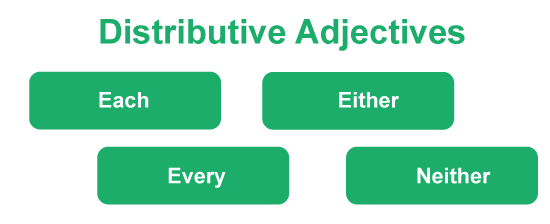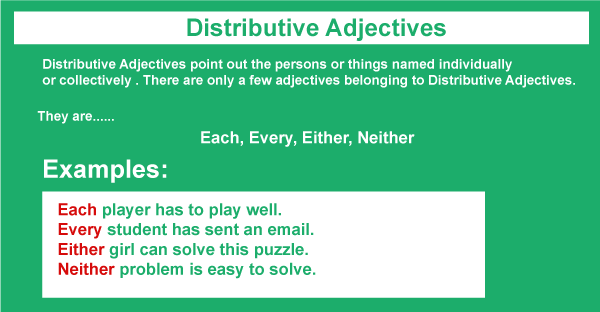Distributive AdjectivesWhat Is the Definition Of A Distributive Adjective?A distributive adjective is a type of adjective that pertains to specific participants of the group. For instance, in the statement, the term each is a distributive adjective. Each student got their own meal. In the statement, the term "every" is a distributive adjective. He offered a bone-toy to every puppy at the campground. 
While these phrases indicate that something is going on in a group as a whole, the distributive adjectives divide the groupings into individual individuals. We're discussing what happens to the participants of a group. Distributive Adjectives, which are used with singular nouns, are often used to refer to a specific group or individual. It is used to change nouns. It is most frequently employed with singular nouns. It refers to each individual or person in a group separately. Such nouns or pronouns invariably accompany these adjectives. It includes E-type adjectives that are used in conjunction with nouns or pronouns in a phrase. Some distributive adjectives are each, every, neither, and either. Distributive adjectives are frequently employed to gently alter the meaning of a sentence. As an example,
While the meanings of these two statements are similar, the first states that every single student received a pen, whilst the second states that a large number of pens were distributed to a cohort of students. The second sentence does not clarify how the pens were dispersed, and it is possible that the students received items as a collective to be shared. When trying to explain precise meanings in instances like this, distributive adjectives come in handy. List Of Distributive AdjectivesFew of the most common distributive adjectives are: Each, every, either, neither, any, both Where should a distributive adjective appear in a statement? Distributive adjectives are usually used prior to the nouns and pronouns they alter:

Examples Of Distributive Adjectives in A SentenceThe examples below demonstrate how to utilize distributive adjectives in phrases. Each and everyBoth the terms each and every are often used to pertain to individual participants of a big group.
Occasionally, the terms are even used together in informal language:
Either, neither, and bothThe phrases either, neither, and both are used to describe situations with two possibilities.
AnyThe word any can apply to either one or all participants of a group.
Best Practices for Distributive Adjective Rules1. In addition to both, demonstrative adjectives are commonly employed with singular nouns. For instance, it is right to say Each doorway has a score on it, and not each doorways have a score on it. As another instance, we say The bird was in neither plant and not The bird was in neither plants. 2. The pronouns each, either, neither, any, and both can all be used. If they are, they may defy the norms of adjectives and can be used alone in a statement: Adjective: Each athlete scored a goal. Pronoun: Each of the sportsmen scored a goal. Adjective: She picked neither offer. Pronoun: Of the 2 choices, she selected neither. 
Examples of Distributive Adjectives in the Sentences
Next TopicInterrogative Adjectives
|
 For Videos Join Our Youtube Channel: Join Now
For Videos Join Our Youtube Channel: Join Now
Feedback
- Send your Feedback to [email protected]
Help Others, Please Share









